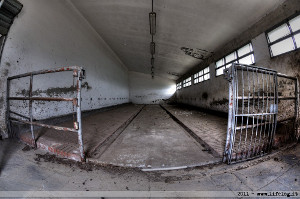Gestation crates – in which sows are kept in isolation and are unable even to walk – are still the most commonly used pig-farming system in Brazil. Hopefully, this will change soon.

Pen in abandoned slaughterhouse - Figline Valdarno, Italy, 2011 (Photo: Pietromassimo Pasqui https://www.facebook.com/PigeoneyesPh)
JBS, a Brazilian multinational firm founded in 1953, is the second-largest producer of pork in Brazil and the largest (by sales) meat-processing company in the world. It produces factory-processed products derived from bovines, chickens and pigs. The company has 150 industrial plants around the world.
At the beginning of June 2015, in its annual report, JBS announced that it is planning to change all its structures to group housing by 2016. This change will be required of their partners too, although no deadline has been announced in that respect. Over 40% of pigs in the farms of its subsidiary Seara are already in group housing.
The end of the use of gestation crates signals an extremely important shift in attitude, which reflects the company’s broader outlook. In its annual report, JBS states: ”We are prepared to meet the demand of our customers and work to adapt the processes, seeking to ensure quality, not adding costs to the products and to the company, and taking into account the sustainability of suppliers.”
BRF, the largest producer of pork in Brazil, announced in November 2014 that it will phase out the use of gestation crates within 12 years.
The executive director of the Brazilian Association of Pig Farmers (ABCS), Sa Nile, told the Carne Tec Brasil website that pig farmers in Brazil must have easier access to funding to implement collective gestation systems. Investment in modern automated collective gestation systems involves a large initial outlay for producers, but it can also result in cost savings in the future, such as reducing the number of employees per array.
“It is not feasible? No. It’s a little more expensive at first, but there is an expectation today, including of a future reduction of operating costs,” Sa Nile said.
You can read more about the animal welfare policies of JBS Foods on the relevant page of their website (in Portuguese).
Free subscription to the AnimalWelfareAndTrade Newsletter: click here
Follow AnimalWelfareAndTrade on Twitter: click here
Follow AnimalWelfareAndTrade on Facebook: click here

